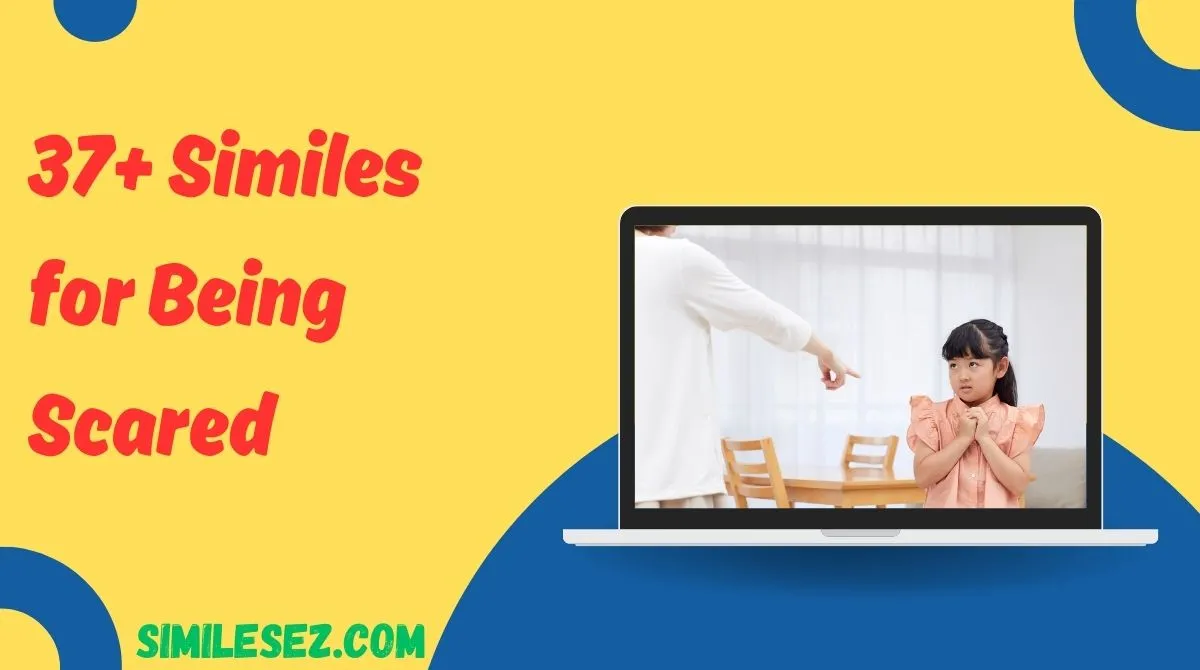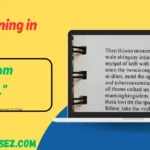Similes are powerful figures of speech that compare one thing to another using words like “as” or “like.”
They make writing more vivid, emotional, and relatable. When it comes to describing fear, similes can capture the exact feeling of being nervous, startled, or terrified.
In this article, you’ll discover 37+ similes for being scared, along with their meanings and examples—perfect for your stories, essays, and creative writing.
What is a Simile?
A simile is a comparison that shows similarity between two different things using “like” or “as.” For example: “She was as quiet as a mouse.” It helps readers visualize emotions more clearly.
5 Quick Similes for Being Scared
| Simile | Meaning | Example Sentence |
|---|---|---|
| As scared as a rabbit | Extremely timid or frightened | He was as scared as a rabbit hiding from a fox. |
| Shaking like a leaf | Trembling with fear or nervousness | She stood shaking like a leaf before her big speech. |
| As pale as a ghost | Looking terrified or shocked | He turned as pale as a ghost after hearing the noise. |
| Like a deer in headlights | Frozen in fear, unable to react | The child stood like a deer in headlights when caught. |
| Heart racing like a drum | Feeling panicked or scared | Her heart was racing like a drum during the thunderstorm. |
Full List of 30+ Similes for Being Scared
1. As scared as a rabbit
- Meaning: Extremely frightened and timid.
- Definition: Compares fear to a rabbit’s natural skittishness.
- Example 1: He was as scared as a rabbit when he heard footsteps behind him.
- Example 2: The boy felt as scared as a rabbit during the haunted house tour.
2. Shaking like a leaf
- Meaning: Trembling uncontrollably from fear.
- Definition: Suggests physical shaking, like a leaf in the wind.
- Example 1: She was shaking like a leaf while waiting for the test results.
- Example 2: His hands shook like a leaf before the big announcement.
3. As pale as a ghost
- Meaning: Looking visibly frightened or shocked.
- Definition: Refers to losing color in the face due to fear.
- Example 1: He turned as pale as a ghost when he saw the accident.
- Example 2: She went pale as a ghost after the horror story.
4. Like a deer in headlights
- Meaning: Frozen in fear and unable to move.
- Definition: Describes someone caught off guard in terror.
- Example 1: He stood like a deer in headlights when asked to speak.
- Example 2: She froze like a deer in headlights during the loud crash.
5. Heart racing like a drum
- Meaning: Feeling intense fear or nervousness.
- Definition: Fear makes the heartbeat loud and rapid.
- Example 1: My heart raced like a drum during the scary movie.
- Example 2: His chest pounded like a drum before the results came out.
6. As nervous as a cat in a room full of rocking chairs
- Meaning: Extremely anxious and jumpy.
- Definition: Highlights restlessness and fear of danger.
- Example 1: She was as nervous as a cat in a room full of rocking chairs.
- Example 2: He paced around, nervous as a cat with nowhere safe to sit.
7. Trembling like jelly
- Meaning: Shaking uncontrollably from fear.
- Definition: Body compared to wobbly jelly when afraid.
- Example 1: He trembled like jelly before the spooky cave.
- Example 2: Her legs shook like jelly during the storm.
8. As jumpy as a kangaroo
- Meaning: Easily startled and afraid.
- Definition: Describes quick, fearful reactions.
- Example 1: He was as jumpy as a kangaroo during the lightning.
- Example 2: She jumped like a kangaroo at every small noise.
9. Frozen like ice
- Meaning: Unable to move out of fear.
- Definition: Fear paralyzes a person, making them rigid.
- Example 1: She was frozen like ice after hearing the scream.
- Example 2: He stood frozen like ice when the dog barked loudly.
10. As silent as the grave
- Meaning: Terrified into complete silence.
- Definition: Compares fear to eerie stillness.
- Example 1: The room was silent as the grave after the thunder.
- Example 2: She stayed silent as the grave when asked about the ghost.
11. Like a child lost in the dark
- Meaning: Helpless and scared.
- Definition: Describes deep fear of the unknown.
- Example 1: He felt like a child lost in the dark after hearing strange noises.
- Example 2: She looked like a lost child in the dark, afraid to move.
12. As frightened as a mouse
- Meaning: Extremely timid and fearful.
- Definition: A common simile for vulnerability.
- Example 1: He was as frightened as a mouse when the teacher yelled.
- Example 2: She hid, frightened as a mouse, behind the sofa.
13. Quivering like a candle flame
- Meaning: Trembling lightly from fear.
- Definition: Suggests fragility and unsteadiness.
- Example 1: His voice quivered like a candle flame.
- Example 2: She stood quivering like a flame in the wind.
14. As uneasy as a fish out of water
- Meaning: Feeling uncomfortable and scared.
- Definition: Suggests being in an unnatural, scary situation.
- Example 1: He felt uneasy as a fish out of water in the dark alley.
- Example 2: She looked like a fish out of water during the speech.
15. Shuddering like a cold breeze
- Meaning: Trembling with fear.
- Definition: Fear runs through the body like cold wind.
- Example 1: He shuddered like a cold breeze passing by.
- Example 2: She shook like a chill swept over her.
16. As scared as a lamb before slaughter
- Meaning: Completely helpless and terrified.
- Definition: A strong image of fear and vulnerability.
- Example 1: He was scared as a lamb led to slaughter.
- Example 2: She looked at him, terrified like a lamb awaiting danger.
17. Like walking on thin ice
- Meaning: Nervous and afraid of making a mistake.
- Definition: Fear of danger or consequences.
- Example 1: He spoke carefully, like walking on thin ice.
- Example 2: She moved like she was on thin ice, scared to slip.
18. As tense as a stretched bowstring
- Meaning: Stressed and fearful.
- Definition: Describes physical and emotional tightness.
- Example 1: His body was tense as a bowstring before the exam.
- Example 2: She waited tense as a bowstring for the verdict.
19. Quaking like thunder
- Meaning: Trembling greatly in fear.
- Definition: Shaking compared to thunderous force.
- Example 1: He quaked like thunder at the teacher’s voice.
- Example 2: She quaked in fear as the shadow grew closer.
20. As wary as a bird in a cage
- Meaning: Nervous and alert to danger.
- Definition: Describes a fearful, watchful state.
- Example 1: She was wary as a bird in a cage.
- Example 2: He looked around, nervous like a trapped bird.
21. Cold as marble
- Meaning: Fear drains warmth from the body.
- Definition: Suggests stiffness and lifelessness.
- Example 1: His hands were cold as marble.
- Example 2: She felt cold as marble after the shock.
22. As startled as a fire alarm
- Meaning: Shocked suddenly by fear.
- Definition: Quick, alarming reaction.
- Example 1: He was startled as a fire alarm at the loud bang.
- Example 2: She jumped as startled as an alarm in the night.
23. Like a candle in the wind
- Meaning: Fragile and fearful.
- Definition: Suggests vulnerability under fear.
- Example 1: She was like a candle in the wind, trembling with fear.
- Example 2: His courage flickered like a candle in the wind.
24. As restless as a haunted soul
- Meaning: Deeply uneasy and scared.
- Definition: Fear likened to unsettled spirits.
- Example 1: He was restless as a haunted soul.
- Example 2: She wandered, restless and fearful like a ghost.
25. Like ice water in veins
- Meaning: Feeling shock or sudden fear.
- Definition: Fear numbs the body.
- Example 1: The news sent ice water through his veins.
- Example 2: She froze, fear like ice in her veins.
26. As helpless as a fly in a web
- Meaning: Unable to escape danger.
- Definition: Strong simile for vulnerability.
- Example 1: He felt helpless as a fly in a spider’s web.
- Example 2: She was trapped, helpless in her fear.
27. Stiff as a board
- Meaning: Frozen in fear.
- Definition: Body rigid due to fright.
- Example 1: She was stiff as a board after the noise.
- Example 2: He lay stiff as a board, too scared to move.
28. As fearful as a hunted fox
- Meaning: Feeling chased and terrified.
- Definition: Constantly alert in fear.
- Example 1: He was fearful as a hunted fox.
- Example 2: She looked around, scared like prey on the run.
29. Quivering like a bow
- Meaning: Slight trembling from fear.
- Definition: Body compared to vibrating bowstring.
- Example 1: His lips quivered like a bowstring.
- Example 2: She trembled like a bow under tension.
30. As uneasy as walking through a graveyard at night
- Meaning: Very scared and uncomfortable.
- Definition: A vivid image of deep fear.
- Example 1: He felt uneasy as walking through a graveyard at night.
- Example 2: She moved quickly, scared like a traveler in a graveyard.
How to Use These Similes in Creative Writing 🎭✍️
- Poems: Use them to intensify emotion and imagery (e.g., “Her hands shook like a candle in the wind”).
- Stories: Add depth to character emotions (e.g., “He froze like ice when he saw the shadow”).
- Songs: Enhance lyrics with vivid comparisons (e.g., “My heart beats like a drum in the dark”).
- Essays: Use sparingly for descriptive impact (e.g., “The witness was as pale as a ghost”).
FAQs About Similes for Being Scared
What are common similes for being scared?
Some popular ones are “shaking like a leaf,” “as pale as a ghost,” and “like a deer in headlights.”
Why use similes to describe fear?
Similes help paint a clear picture of emotions, making the reader feel the fear more vividly.
Can similes be used in academic writing?
Yes, but sparingly. They work best in creative essays, literature, and descriptive writing rather than formal research.
How do similes differ from metaphors?
Similes use “like” or “as” to compare, while metaphors state something is something else.
Are similes only for creative writers?
No, they can be used by anyone—students, bloggers, songwriters, or storytellers—to make language more expressive.
Conclusion
Similes are a wonderful way to capture the feeling of fear in words.
From “shaking like a leaf” to “as scared as a rabbit,” these expressions bring writing to life.
Whether you’re writing poetry, stories, or essays, using these similes will help you connect with your readers and express emotions vividly.










